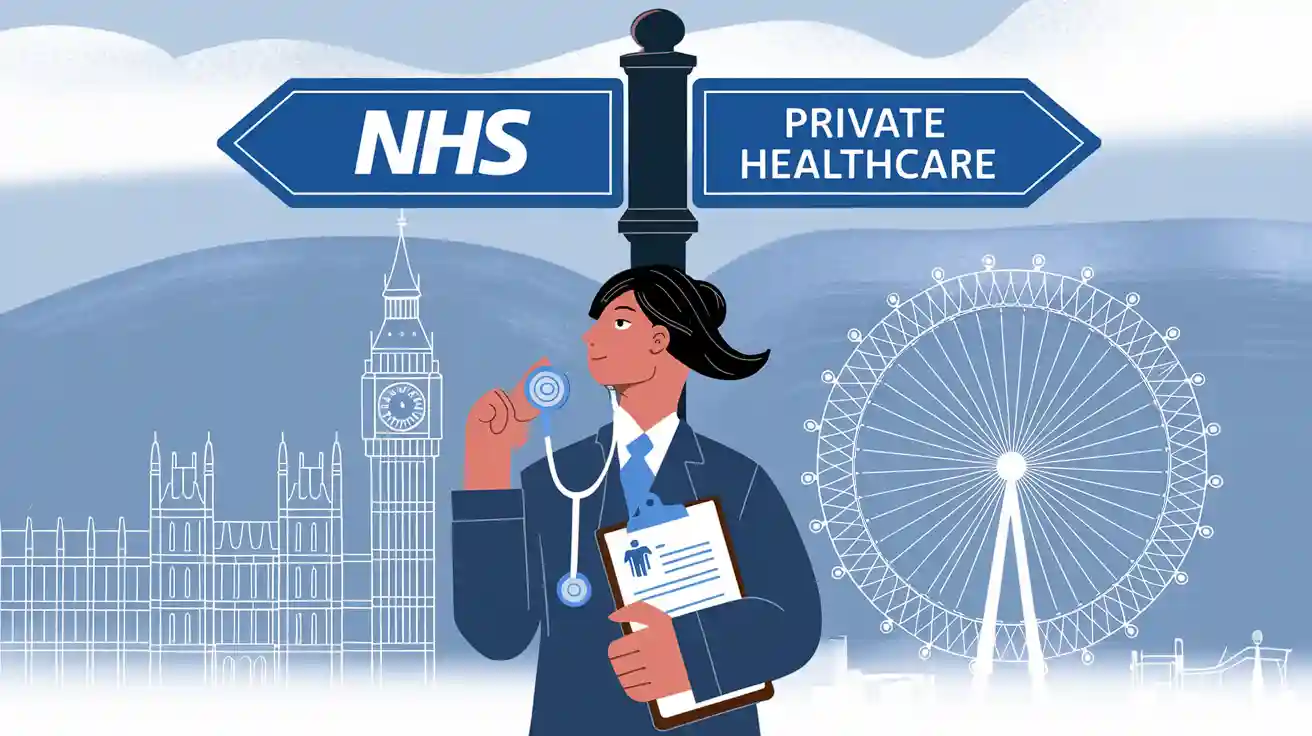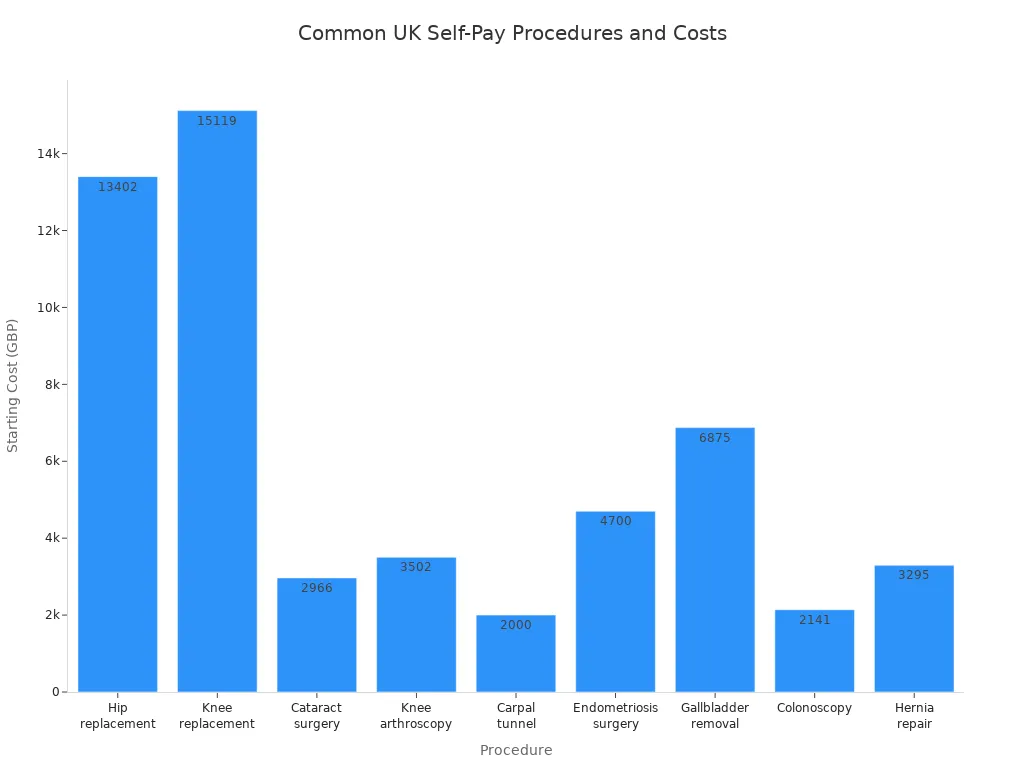Why People in the UK Are Seeking Private Healthcare Solutions

Many people in the UK now choose private healthcare. They want faster and more personal treatment. NHS waiting times have got longer since COVID-19. This means patients must wait a long time. More adults now have private medical insurance. In 2024, 7.6 million adults had it. In 2020, only 6.7 million adults had it.
Year | Adults with Private Medical Insurance |
|---|---|
2020 | 6.7 million |
2024 | 7.6 million |
This change shows why UK private healthcare is important. People want quicker care and more control over their health.
Key Takeaways
NHS waiting times are long. Many people pick private healthcare for quicker treatment and less worry. Private healthcare gives more personal care. Patients can choose their doctor, hospital, and when to have appointments. Private medical insurance helps people get care faster. Only about 12% of people in the UK have this insurance. Self-pay lets patients pick when and where to get treated. The costs can be high. Using private healthcare can help the NHS. It gives patients more choice and helps them feel calm.
NHS Waiting Times
Delays in Appointments
NHS waiting times worry many people in the UK. In March 2022, 6.3 million patients in England waited for elective treatment. This number does not count everyone who needs care. Some people are on hidden waiting lists. Fewer referrals and smaller clinics during COVID-19 made this worse. The biggest backlogs are in general surgery and orthopaedics. If there are not more resources, waiting lists may stay high or even get bigger until 2030.
Many things cause NHS appointment delays:
There is not always enough equipment for everyone.
Missed appointments waste important time. Over 15 million NHS appointments are missed each year, including 7.2 million GP appointments.
Patients cannot leave hospital if there is no social care, so beds stay full.
Ambulance delays and long waits in A&E make things worse.
The NHS has more patients than it can manage.
Sometimes, patients wait hours in A&E. In March 2025, 25% of patients waited over four hours. More than 46,000 waited over twelve hours for a hospital bed. Long waits can make health problems worse and even increase the risk of dying.
Impact on Patients
Long NHS waits affect patients in many ways. People who wait longer for treatment often get sicker. For example, cancer patients may die if care is delayed. People waiting for heart surgery face more risks before their operation. Those waiting months for mental health help may feel worse.
Waiting a long time also causes stress, worry, and a lower quality of life. Patients may feel upset or helpless when they cannot get care quickly.
Research shows that when NHS waits get longer, more people choose private healthcare. People with more money or education are more likely to go private. This means some people get faster care while others wait longer. The UK Government now uses private hospitals to help with NHS waiting lists. This shows more people want other options when NHS waits are long.
NHS waiting times affect both health and how happy people are with care. People who wait too long may lose trust in the NHS and look for other ways to get help.
Speed of Private Healthcare
Faster Access
Many people in the UK pick private healthcare for quicker care. NHS waiting lists for tests like MRI scans can last weeks or months. The NHS tries to keep waits under six weeks, but this does not always happen. Some people have waited up to five years for things like knee replacements. Waiting so long can make people stressed and their health worse.
Private healthcare lets people see doctors much faster. They can book scans or visits in just days or weeks. Results often come back quickly, sometimes in a few days. Private clinics are faster because they have fewer patients and simpler systems. This helps people get treatment sooner. But private care costs more, so not everyone can afford it.
Many people think shorter waits in private care help them avoid pain and worry. They pick private care when they need help fast, even if it costs more.
Waiting times are not the same everywhere. In the North of England, private waits are often shorter than in the South. London has fewer NHS-paid private treatments, so some people find it harder to get care.
Personalised Care
Private healthcare is known for being more personal. People can pick their doctor, hospital, and when they want to go. This choice gives them more control over their care. Private GPs let people see a doctor quickly for any problem. Many like seeing the same doctor each time, which builds trust and helps care stay the same.
Flexible booking makes it easy to fit appointments into busy days.
Doctors spend more time with each person.
People get planned treatments faster and do not wait as long as with the NHS.
New tools and online visits make care fit each person better.
Aspect | Private Healthcare Personalised Care | NHS Personalised Care |
|---|---|---|
Choice and Flexibility | Lots of choice, care made to fit you, help any time | Not much choice, set plans |
Continuity and Relationship | Better relationships with doctors, steady support | Changing staff can make care less steady |
Speed and Access | Quicker care, easy to book | Longer waits, usual systems |
People go private because they want faster care and a more personal touch. These reasons show why more people in the UK now pick private healthcare.
UK Private Healthcare Choices
Choose Where You Get Your Treatment
Lots of people in the UK want to pick where they get treated. This is a main reason they choose uk private healthcare. Patients can pick a hospital or clinic that fits their needs. They often check what other patients say and how soon they can get seen. Some want a hospital near home, but others want a special centre.
Private healthcare providers in the UK include well-known names like HCA Healthcare, Spire Healthcare, Nuffield Health, Circle Health Group, and Ramsay Health Care. These groups have many services and facilities.
People can pay for private care in different ways. They might use private medical insurance, pay themselves, or get a medical loan. Many private hospitals have fixed price surgery plans, so patients know the cost before starting. The process starts with a GP referral, then an outpatient visit and a fixed price quote. If they change their mind, they can go back to NHS care.
Patients can book appointments in person, by phone, or video call.
Private consultations usually cost between £150 and £250.
Self-paying patients can look at prices and pick any provider.
This choice gives patients more control over their health journey.
Access to Specialists
Another reason people want uk private healthcare is to see a specialist quickly. Private hospitals often have more consultants and shorter waits. Some treatments are only available privately, not always on the NHS. For example, some orthopaedic and cataract surgeries may be limited on the NHS. Private psychiatric inpatient care is also easier to get, as NHS mental health beds have closed.
Private healthcare providers offer things like mental health support, cancer drug access, and 24/7 online GP appointments. Many people like getting the treatment they need without waiting long. They can also pick a consultant based on their skills and when they are free.
Being able to choose where you get treated and see the right specialist helps people feel sure about their care. This is a big reason why more people now turn to uk private healthcare for help.
Insurance and Affordability
Private Medical Insurance
Many people in the UK think about private medical insurance for faster care. By the end of 2023, 4.68 million people had a policy. This is the most in five years. Most people get insurance from their job. Fewer people buy it on their own. The market for private medical and dental cover grew to £7.59 billion in 2023. This means more people want extra protection.
Metric | Value | Context |
|---|---|---|
Number of PMI policyholders (end of 2023) | 4.68 million | Record high in the past five years |
Percentage of UK population with PMI | 11.8% | Highest since 2008 |
Number covered by employer policies | 3.8 million | Majority of policyholders |
Number covered by individual policies | 0.88 million | Minority of policyholders |
Total market value of private medical and dental cover (2023) | £7.59 billion | Increased from £6.76 billion in 2022 |
Private medical cover market value (2023) | £6.15 billion | 12.2% increase year-on-year |
Claims paid out by insurers (2023) | £3.57 billion | 21% increase from 2022 |
The price of private medical insurance changes with age, where you live, and your health. For example, a 50-year-old non-smoker pays about £70 each month. A family with two children pays around £105 each month. Insurance helps people feel safe and skip long NHS waits. But it does not pay for everything. Some plans do not cover old health problems or some treatments.
Private medical insurance gives faster care, but not everyone can get it. Only about 12% of people in the UK have this cover. So, cost and access are still big problems.
Self-Pay Options
Self-pay is another way to get private healthcare. People pay for their own treatment. They often do this to avoid long NHS waits. The most common self-pay treatments are hip and knee replacements, cataract surgery, and hernia repairs.
Procedure | Approximate Starting Cost (GBP) |
|---|---|
£13,402 | |
Knee replacement surgery | £15,119 |
Cataract surgery (one eye) | £2,966 |
Knee arthroscopy | £3,502 |
Carpal tunnel surgery | Around £2,000 |
Endometriosis surgery | £4,700 |
Gallbladder removal | £6,875 |
Colonoscopy | £2,141 |
Hernia repair surgery | £3,295 |

Self-pay lets people pick when and where to get care. But high prices mean only some people can use this choice. Many spend about £500, but some pay up to £10,000 for care. This makes it hard for people with less money to get private treatment.
The NHS is still free for everyone. But private healthcare is faster and more comfortable for those who can pay. This is why people with more money choose private care. Others still use the NHS.
Peace of Mind
Control Over Care
Many people in the UK want to make choices about their health. They feel worried if they cannot pick their doctor or appointment time. Private care lets them decide when and where to get help. This makes people feel calmer and more sure about their treatment.
When patients choose their consultant or hospital, they often get better care. They trust their doctors and feel heard during visits. This trust helps them talk more openly and feel safer. People also like planning care around work or family.
Knowing what will happen helps patients feel calm. This peace of mind can help them heal faster and worry less about being ill.
Reducing NHS Pressure
Picking private care can help the NHS too. When some people go private, NHS waiting lists may get shorter. This means the NHS can focus on people who need urgent help.
Private and NHS care are linked in many ways. Private hospitals often work with NHS staff and hospitals. Some NHS hospitals have special units for private patients. This brings more money to the NHS, but it can also cause problems. NHS staff sometimes work in both places. How this affects the NHS depends on staff and hospital resources.
Both use the same staff and buildings.
More people want private care as NHS waits get longer.
Stopping private care will not fix NHS problems. Experts say both should work together. This can help everyone in the UK get better care.
People in the UK pick private healthcare for different reasons. They want to see a specialist faster and not wait as long. They like having more control over their care and when they have appointments. Private care gives them more comfort and privacy. They often see the same consultant each time. People can pay with insurance or by themselves, but money worries still matter.
Patients should think about what they need for their health. They also need to look at how much money they have and what they like. Looking up hospitals or insurance plans can help them choose if private care is best for them.
FAQ
Why do people in the UK choose private healthcare?
People want to get help faster. They also want more control over their care. Many worry about waiting a long time for NHS help. Private healthcare gives quicker appointments and more choices. It feels more personal for each patient. This makes people feel safer and more sure about their health.
Why does private healthcare cost more than NHS care?
Private healthcare uses extra things and gives more options. Patients pay for faster help, private rooms, and seeing specialists. The NHS is paid for by taxes, so people do not pay when they use it. Private providers set prices to cover their costs and make money.
Why are more people buying private medical insurance?
Many people want to skip long NHS waits. Private insurance helps them get treatment sooner. It also gives peace of mind. Some jobs give insurance as a benefit. More people want fast care, so insurance is now more popular.
Why do some treatments only exist in private healthcare?
Some new drugs or treatments are not on the NHS. Private providers can offer these because they have different money and fewer rules. People who want the newest treatments often pick private care for this reason.
Why does private healthcare help reduce NHS pressure?
When people use private care, there is more space in the NHS. This can make waiting lists shorter. NHS staff can then help people who need care quickly. Sometimes, private hospitals work with the NHS to treat more patients.
See Also
Securing NHS Funding When Choosing Private Treatment Options
Effective Ways To Speed Up NHS Healthcare Access
Implications Of Ending NHS England For Healthcare In 2025

